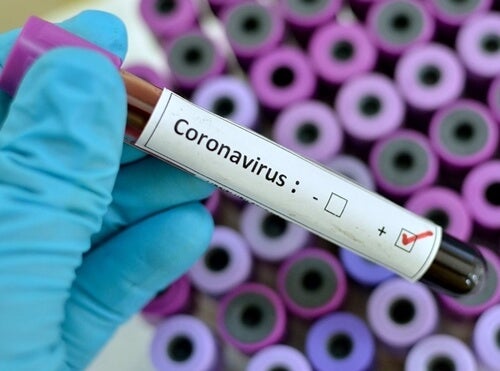Psychological Advice Regarding Coronavirus: Antidotes to Avoid Panic


Written and verified by the psychologist Valeria Sabater
In the midst of the coronavirus crisis, we’re seeing another deadly virus that’s spreading around the world almost more rapidly than COVID-19. That virus is fear itself. You only have to look at your social networks to see how the news spreads by the second, filling you with fear and even panic. However, in the midst of this scenario of concern, there’s no better vaccine than good psychological advice regarding coronavirus.
Associations such as the American Psychological Association (APA) are telling us that anxiety about the coronavirus is an “infection” that’s almost as dangerous as the virus itself.
The purchase of masks and disinfectants has skyrocketed, we get scared when someone sneezes near us, and we’re starting to alter our daily habits. Many people are thinking twice about getting on a plane, for example.
Are we going to extremes here? Maybe. Is it wrong to feel fear in the midst of this situation? No, it isn’t.
It’s logical and understandable to feel fear and unease when faced with a virus as potent as this one. However, fear should always act as a warning system and not as an alarm. It should help us react in a reasonable and logical way and not through panic and irrational behaviors. This is how we give the best of ourselves and how we deal with any problem that may arise.
To achieve this, and to react appropriately to the circumstances we’re experiencing right now, requires us to take some very specific advice into account.

Three pieces of psychological advice regarding coronavirus
Some say that the COVID-19 virus was the last one to come out of Pandora’s virus box. It’s possible, however, that something else was also in that mythical box created by Hephaestus on Zeus’ orders: hope.
We mustn’t forget that our health systems are well-prepared and that we’ve been dealing with many diseases and epidemics for decades, such as SARS or MERS.
Experts such as Baruch Fischhoff, a member of the American Psychological Association (APA) and expert in risk perception and behavioral science, point out that these situations demand the best of us.
In his own words: “In crisis situations, people must come together, support each other, and act with courage. If we panic, we deprive ourselves of the opportunity to act in a coordinated manner”.
Thus, let’s have a look at some timely advice in the midst of this coronavirus crisis.
1. Over-information leads to excessive concern: let’s regulate how much exposure we have to it
There are images that fill us with fear, but it’s not just any old fear. It’s that primitive fear that words such as “pandemic”, “infection”, and “virus” produce in us. Images of doctors fully dressed in their protective suits and people wearing masks immediately generate a sense of alarm in us.
If you add to this all the excesses of the information you’re subjected to, then it’s almost inevitable that this fear will become irrational at some point. You know just how much information you’re constantly being exposed to, almost by the second. You also know that, as soon as you turn on the TV or the radio, the first word you’ll probably hear is “coronavirus”.
- Advice. Control the amount of exposure you have to news about this topic. You need to live as normal a life as you can, trying to ensure that the news about the coronavirus doesn’t orbit continuously around you during the day. Look for official sources and avoid toxic information. Likewise, when you feel excessively concerned, it’s best to devote time to the activities that interest you most or that help you relax.

2. Disinformation is the worst of all viruses: “vaccinating” yourself against hoaxes
Another useful piece of psychological advice regarding coronavirus that you should take into account concerns hoaxes, or fake news. There’s no virus as lethal as disinformation. This is the type of news that almost immediately causes panic. With a click, people instantly share this news and it spreads like a virus.
In recent days, you may have seen information telling you that saltwater prevents the spread of COVID-19. You may have also seen manipulated images of groups of people seemingly dead on the streets of Wuhan. We’ve even been told that Bill Gates holds the patent on this type of coronavirus.
There’s never a lack of conspiracy theories telling us that the number of deaths is higher than we’re being told or that the virus has been deliberately released by the United States or Russia in order to destabilize the economy. The list goes on and on…
- Advice. Bear in mind that approximately 40% of the news you receive is false. True information is the real vaccine here, and this requires you to be cautious and proactive in everything that you read. Look for the latest government information and the news from organizations such as the World Health Organization.
3. Staying calm is your best bet: stay alert but don’t panic
When faced with the “panic virus”, the best antidote is to keep calm. In the face of fear and anxiety, it’s better to be on the alert than to be alarmed. What does this mean? It implies that people act much better in a state of psychological calm. Nevertheless, this doesn’t mean that you should be indifferent to the news.
It’s just a matter of keeping an eye on what’s going on without experiencing that irrational fear that can lead to behavior that does more harm than good.
- Advice. One of the most basic psychological tips for dealing with the coronavirus is to continue living as normal a life as possible. Routine is your best ally. At the same time, you should also make sure that you keep abreast of the latest developments at some point in the day. We must all be aware of the latest expert advice.

In conclusion, we’re aware that the Covid-19 virus situation means that we need to be aware of every development. We’re being exposed to a new virus, and health organizations need time to be able to analyze how it acts.
So, what should you do? Simply continue with your daily routine as much as possible, follow the basic hygiene advice, and comply with the instructions given to us by the official authorities.
Remember once again the words of Dr. Baruch Fischhoff: we can resolve every crisis by acting without panic and in a joint and coordinated manner. Let’s all follow this valuable advice!
This text is provided for informational purposes only and does not replace consultation with a professional. If in doubt, consult your specialist.








